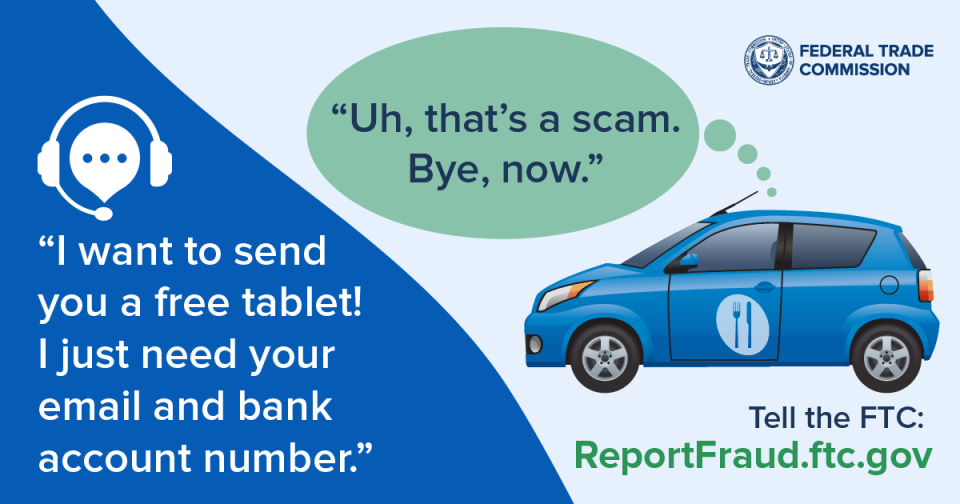
You may have heard about food delivery services like DoorDash or Uber Eats: you order through a restaurant’s website or a delivery service’s mobile app and drivers deliver your food. We’re hearing about a new scam targeting food delivery drivers and restaurants.
Scammers posing as “support” from food delivery services are contacting delivery drivers and restaurants and trying to steal their personal and financial information.
In one scenario, the scammer tells delivery drivers and restaurants they’re sending a free tablet or printer to handle food delivery orders. To do that, they say, they need to “verify” your phone number, email and login, Social Security number and bank account to send the equipment.
In another scenario, the scammer says they need the driver’s email or bank account because there’s a problem with an order, or they want to refund them money from a canceled order. After getting the driver or restaurant owner’s email, the scammer may ask for an email verification code...which you never want to share.
If you get requests like this, no matter where you work: Stop. Here’s how to avoid the scams.
- Don’t give your personal or financial information to someone who unexpectedly calls, texts, or emails you. They may be trying to steal from you.
- If you think the request is legitimate, contact the business directly. But use a phone number you know is real or a website or app you found yourself.
- Never share an email verification code with someone if you didn’t contact them first. Scammers are after your information and money. Sharing verification codes makes it easier for them to pretend to be you. Once they’re “you,” they have access to your accounts and can take your money.
Find out what to do if you paid a scammer or gave a scammer your personal information.
And if you spot these scams, tell the FTC at ReportFraud.ftc.gov. When you report a scam, you help the FTC and other law enforcement agencies stop scams.

Today, I received a phone call from 202 864 0151. He said he was calling on behalf of the Consumer Protection Bureau about a sweepstake award. I did not enter a sweepstakes so I hung up.
Thank you for the advice
For me, it's very simple: I'm so glad that you folks are on the job protecting us. Thanks so much for all your efforts.
Thanks good tip delivery people are all over
When looking up a phone number on google please make sure it is the official site for that company. Scammers get there company listed on Google and will impersonate a company. I had a reservation with Hertz. And I wanted to pay in advance since you get a big discount. I looked up the company on Google only to find out it was a phone number of a scammer. When the scammer wanted me purchase a gift card I told him that’s what scammers do. He hung up.
I was charged for Door Dash for 3 montgs when I never signed up for it. I luve remotely where they do 't deluver to my area
keep up the good work.
I've been reading your info emails for a long time and they have been very useful and helpful.
Thank You
This has happened to me, shortly after my oldest son died his wife called me asking for a code that had been sent to my phone. What should I do now?
In reply to This has happened to me,… by Melvin BB Grant
Ask her what the code is for. If you are confused despite her explanation or have no idea what she is talking about, tell her you do not like to be put on the spot like that because there are scammers that do this. Usually, what she is asking for would be what is called a "2fa" code or two-factor-authentication code from an account. One that is either under your name, an account under his name with your phone set as an emergency backup, or a joint account of you & your late sons (condolences). Know that whatever it is for, if it is a 2fa code, it will give her the ability to change passwords on whatever the account is. If you feel pressured, consult with an attorney.
Thank you for again telling us about the latest scams.
I no longer answer a call that get through without the caller having an identity that I can check; even if they are leaving a message. I refuse to use my time. Lost a lot of patience over the last 10 years. There's not anything free.
I would like to request that all mobile apps use some kind of identity verification i’ve been scammed several times thru my bank and its always mobile app with restaurants etc